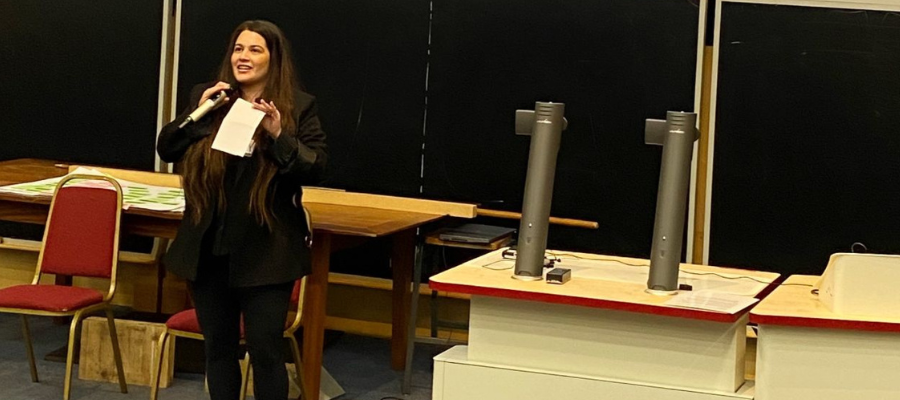🕒 Article read time: 2 minutes
Logistics UK hosts roadmap session on sustainable road freight

On 4 and 5 December, Logistics UK partnered with the Centre for Sustainable Road Freight at the 10th International Workshop on Sustainable Road Freight. With representatives from industry, academia and policy, attendees congregated in Cambridge for the two-day event to discuss ways to improve sustainability and resilience of logistics and freight transport.
With a host of presentations on the latest research around the global logistics sector, academics discussed a range of topics including electrification, modal shift and policy. Logistics UK organised a breakout session on day two of the conference, with Mariefi Kamizouli, Head of Economics and Productivity, leading the activity on creating a roadmap to 2035.
The overall aim of the session was to identify opportunities and barriers to reaching 2035 decarbonisation targets, with delegates splitting up into groups to discuss various aspects of the transition, from technological shift to market mechanisms to generate funds. With six groups in the room and an additional seventh group for attendees online, the groups shared lively discussions on how to create and then realise positive change. The groups looked at policy and government, the environment, legal frameworks, finance and investment levers, as well as social changes and technology development, all through the lens of trying to reduce emissions and meet decarbonisation deadlines.
Technology, policy and regulations
Professor Allan McKinnon hosted the group on technological innovation, where ideas on creating platforms for data sharing and more charge slots, improved modal interchanges and the use of private wire, were suggested as options. Looking further ahead, attendees discussed the role of autonomous electric trucks and new battery technology. The role of AI, quantum computers and drones were also considered.
Groups focusing on steps the government and policymakers can take to ensure the road freight sector achieves its sustainability objectives by 2035 debated a range of potential initiatives. In the short term, ideas included carrying out more research demonstration projects in collaboration with industry and academia. The theme for collaboration was strong throughout the two days and many mentioned the need to improve ruling around securing planning permission to access grid connection. Others also touched on the need to better facilitate training programmes to help with skills shortages, specifically across driver and technician roles. Actions for the medium term included developing the National Freight Network, installing charging stations for battery electric vehicles (BEVs), increasing the use of government subsidies and implementing certifications for data and eco-driving to create trustworthiness. Attendees also considered the need for a joined-up approach when it comes to driver rest stops and coordinating these with charging infrastructure to allow for a more efficient system.
The online group looked at legal/regulatory interventions to better facilitate the transition away from fossil fuels. Ideas included low emission zones and addressing legislative barriers that make securing new electrical grid connections complicated, expensive and time consuming. There was also discussion on how adjusted weights and dimensions regulations would enable operators to transport a greater payload, one which is otherwise significantly reduced due to battery weight. Delegates also considered how investing in shared multi-service warehouses in cities could help to reduce the transportation of goods.
The role of behavioural change, financial mechanisms and environment
At the same time, delegates considered what social attitudes and behavioural changes between now and 2035 are likely to impact consumer and business demand for sustainable road freight. Discussion covered the need for more education on the link between consumption and freight emissions. This was linked to thinking about whether the expectation around ‘instant’ deliveries is too high and unsustainable in the long term.
A further group looked at financial mechanisms and levers to propel progress forward. Attendees discussed reviewing import taxes on BEVs, the role of government subsidy for low carbon vehicles, and infrastructure. With greater infrastructure for electrification required, effective long-term schemes for public funding and taxation are also important. Changes that could be made in the medium term included the idea of a carbon border adjustment mechanism for imported trucks and the roll-out of a universal and accurate carbon pricing system. Long-term ideas focused on the role of insurance and how the industry can help invest in the transition.
When it came to looking at environmental trends, one group discussed increasing low emission zones in cities – which was closely linked to improving emissions data and how important it is to be able to track progress and impact. Wider implications included water pollution, considering the second and third life of batteries, and adapting to more extreme weather conditions as a result of climate change.
Take aways
Overall, there was agreement that lots more needs to be done in order to decarbonise freight, however, many of the conversations focused on initiatives that are either already in motion or due to be. What remains clear is to create a pathway to sustainable road freight, there needs to be much greater collaboration between industry, research, policy and other stakeholders – particularly in relation to data sharing - and at both national and international scales.
Published On: 21/12/2023 14:30:00

Comments Section
If you are a Logistics UK member login to add comments.